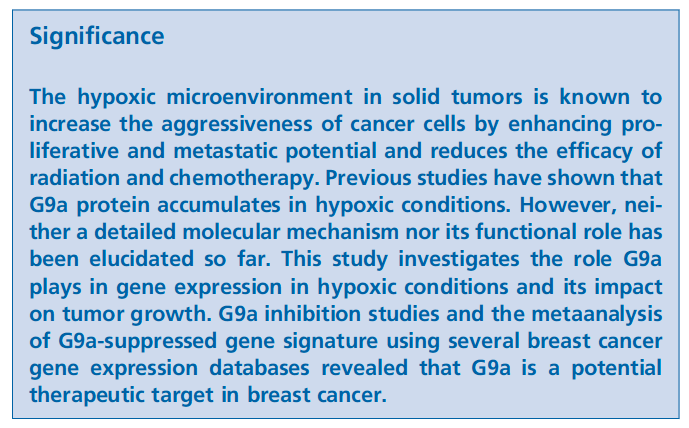Australian epigenetics research news June – July 2017
Recent Posts
Spotlight on: Melanie Eckersley-Maslin 25 November 2022
Spotlight on: Jessamy Tiffen 25 July 2022
ECR Spotlight on: Alex Woodworth 16 July 2022
Epigenetics 2022: Four weeks left for poster abstract submissions! 15 July 2022
Emma Whitelaw ECR Publication Award 30 June 2022
Epigenetics 2022 – Meet the speakers 17 June 2022
ECR Spotlight on: Kate Giles 31 May 2022
Spotlight on: Luciano Martelotto 30 May 2022
Epigenetics 2022 speakers announced 20 April 2022
Spotlight on: Hamish King 18 April 2022
ECR Spotlight on: William Schierding 6 April 2022
Spotlight on: Louise Bicknell 14 March 2022
Categories
News (57)
Opportunities (3)
Publications (7)
Spotlight on … (16)
World epi news (2)
Archived news
2022 (12)
2021 (9)
2020 (9)
2019 (1)
2018 (6)
2017 (6)
2016 (6)
2015 (17)
2014 (1)
by AEpiA| Aug 18, 2017 | News, Publications
Some highlights of Australian epigenetics publications in June-July 2017:
– Do you have any research news you would like to share with AEpiA members? Please email us about any recent publications, awards or events!
Click chemistry enables preclinical evaluation of targeted epigenetic therapies In this elegant study published in Science, Prof Mark Dawson and his team at the Peter MacCallum Cancer Centre in Melbourne partnered with GlaxoSmithKline to modify the epigenetic-based therapy, BET bromodomain inhibitors, to create functionally conserved compounds that are amenable to click chemistry. The authors describe how adding chemically reactive moieties to amenable click chemistry, while preserving the functional integrity of the small molecule (in this case BET inhibitors), allows these molecules to be used in a similar way to how antibodies are used in cell and molecular biology. The study explored the gene regulatory function of BRD4 (bromodomain containing protein 4) and the transcriptional changes induced by BET inhibitors using click proteomics and click sequencing. This approach allowed fluorochromes and/or affinity tags to react with the functionalized drugs in a cellular context and thereby revealed insight into the cellular and molecular mechanisms of the therapy. Using high-resolution microscopy and flow cytometry in an acute leukemia mouse model the authors went on to demonstrate the power of this framework for the preclinical assessment of a wide range of drugs.
Differential intron retention in Jumonji chromatin modifier genes is implicated in reptile temperature-dependent sex determination In an Australia-wide collaboration, Prof Arthur Georges and colleagues at the University of Canberra’s Institute for Applied Ecology, the National Research Collections Australia of CSIRO; the Garvan Institute of Medical Research, UNSW Sydney and La Trobe University, explore the fact that “in many vertebrates, sex of offspring is determined by external environmental cues rather than by sex chromosomes.” The authors use the unique Australian central bearded dragon, in which chromosomal sex determination is overridden at high temperatures to produce sex-reversed female offspring, to probe into this mysterious process. They show intron retention in two Jumonji family genes, JARID2 and JMJD3, and propose that the perturbation of JARID2/JMJD3 function may alter the epigenetic landscape to override chromosomal sex-determining cues, triggering sex reversal at extreme temperatures. Their observation further extends to alligators and turtles, indicating a reptile-wide mechanism for this phenomenon. The findings were published in Science Advances.
Review: DNA methylation and the preservation of cell identity In June, Current Opinion in Genetics & Development published a review by Dr Ozren Bogdanovic of the Garvan Institute of Medical research in Sydney and ProfRyan Lister of the Harry Perkins Institute of Medical Research in Perth. The review systematically explores the “roles of DNA methylation in the establishment and maintenance of cell identity during development.” The authors bring attention particularly to insights obtained from in vivo studies.
Review: Challenges in defining the role of intron retention in normal biology and disease From the Centenary Institute at the University of Sydney, Prof John Rasko and colleagues Darya Vanichkina, Ulf Schmitz and Justin Wong discuss the difficulties facing of the newly evolving field of intron retention. The review provides an overview of the challenges of detecting and quantifying retained introns and in determining their effects on cellular phenotype. The authors then highlight approaches that can be used to address these issues.
Review: Epigenetic modulation in cancer immunotherapy Dr Stuart Gallagher, Dr Elena Shklovskaya and Prof Peter Hersey of the The Centenary Institute, University of Sydney and the Melanoma Institute Australia, in Sydney, review recent findings on epigenetic modulation to improve cancer immunotherapy. They focus on “the inhibitors of the CTLA4 and PD1 immune checkpoints and epigenetic modifiers of histone acetylation and methylation and DNA methylation.” The review was published in Current Opinion in Pharmacology.
G9a drives hypoxia-mediated gene repression for breast cancer cell survival and tumorigenesis A/Prof Jason Lee from the Queensland Institute of Medical Research (QIMR) in Brisbane led an extensive study on the role of G9a in regulating gene expression in hypoxia. The findings provide “an insight into the role G9a plays as an epigenetic mediator of hypoxic response, which can be used as a diagnostic marker.” The findings demonstrate the potential use of G9a, an epigenetic regulator that methylates H3K9, as a therapeutic target for solid cancers.
Germ line–inherited H3K27me3 restricts enhancer function during maternal-to-zygotic transition Researchers at the Max Planck Institute of Immunobiology and Epigenetics, in Freiburg, Germany have produced a seminal study on the mechanism and consequence of transgenerational epigenetic inheritance. Dr Ozren Bogdanovic, from the Garvan Institute of Medical Research, contributed to the study, which was published in Science last month. Using drosophila as a model system, the researchers elegantly demonstrated that “maternally inherited H3K27me3, propagated in the early embryo, regulates the activation of enhancers and lineage-specific genes during development.” Read more in Garvan news.









